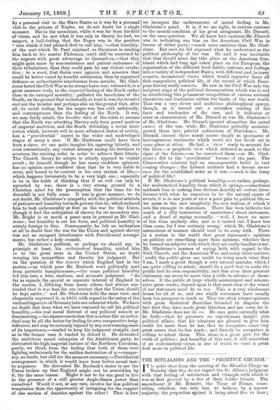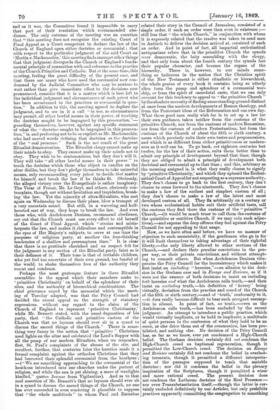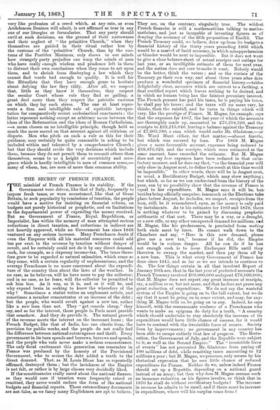THE RITUALISTS AND THE "PRIMITIVE CHURCH."
IT isquite clear from the meeting of the Ritualist Clergy on Tuesday that they do not regard the St. Alban's judgment with that feeling of satisfaction and triumph with which it was at first greeted by a few of their bolder friends. The amendment of Mr. Bennett, the Vicar of Frome, counselling rebellion, was only lost, we believe, by a narrow majority, the proportion against it being about five to four ; and as it was, the Committee found it impossible to carry that part of their resolution which recommended obedience. The only outcome of the meeting was an assertion that "this meeting does not recognize the existing Court of Final Appeal as a Court competent to declare the law of the Church of England upon either doctrine or ceremonial ; that with respect to the particular judgment of the said Court on 'Martin v. Mackonochie,' this meeting finds amongst other things that that judgment disregards the Church of England's fundamental principle of connection with and reference to the practice of the Church Primitive and Catholic. But at the same time, this meeting, feeling the great difficulty of the present case, and that there are many who have used the ceremonial now condemned by the Judicial Committee who may be anxious to wait rather than give immediate effect to the decisions now pronounced, consider that it is a matter which is best left to the individual judgment and circumstances of each priest who has been accustomed to the practices or ceremonial in question." In addition to this, the meeting agreed to deplore the judgment, and to see in it a call "to use, as circumstances may permit, all other lawful means in their power, of teaching the doctrine sought to be impugned by this prosecution,"— guarding themselves, however, against any specific statement of what the "doctrine sought to be impugned in this prosecution," is, and preferring not to be so explicit as Mr. Mackonochie, who had moved words defining that doctrine as the doctrine of the "real presence." Such is the net result of the great Ritualist demonstration. The Ritualist clergy cannot make up their minds to obey. They cannot make up their minds not to obey. They wish to be contumacious, but they don't will it. They will take "all other lawful means in their power" to teach the doctrine which those who object to candles on the altar dislike, but they don't pledge themselves to take unlawful means, only recommending every priest to decide that matter for himself, and break the law if he thinks fit. Obviously, the alleged victory over the Evangelicals is rather imaginary. The Vicar of Frome, Mr. Le Geyt, and others, obviously contemplate, though not without hesitation and trepidation, breaking the law. Yet the minority of ultra-Ritualists, who met again on Wednesday to discuss their plans, blew a trumpet of a very uncertain sound. But still, in a wavering and halfhearted sort of way, they hope to break the law. And even those who, with Archdeacon Denison, recommend obedience, cry out that the Church must use every effort to rid herself of the Court of Final Appeal, which "strains and misinterprets the law, and makes it ridiculous and contemptible in the eyes of Her Majesty's subjects, to serve at one time the purposes of religious party, at another the free-thinking tendencies of a shallow and presumptous time." It is clear that there is no gratitude cherished and no respect felt for the judgment in any section of the Ritualist party, faint as is their defiance of it. Their tone is that of irritable children, who yet feel too uncertain of their own ground, too fearful of the world, to shake themselves free of the authority they resent and condemn.
Perhaps the most grotesque feature in these Ritualist assemblies is the appeal which their members make to primitive Christianity' on behalf of the splendour of their rites, and the authority of hierarchical combinations. The chief grievance urged by the memorial which the meeting of Tuesday adopted, was that the Privy Council had decided the recent appeal on the strength of statutory expressions, without any regard to the claim of the Church of England to represent primitive Christianity,' while Mr. Bennett stated, with the usual dogmatism of his party, that "the Catholic and primitive custom of the Church was that no layman should ever sit in a synod to discuss the sacred things of the Church." There is something very funny in the notion that " primitive " Christians used lights on the altar and celebrated the Lord's Supper with all the pomp of our modern Ritualists, when we remember, first, St. Paul's complaints of the abuses of the rite, and recollect, further, that centuries later the heretics made it a formal complaint against the orthodox Christians that they had borrowed their splendid ceremonial from the heathens ; —(" We see something approaching to the ceremonial of the heathens introduced into our churches under the pretext of religion, and while the sun is yet shining, a mass of waxlights kindled," quotes Jerome from Vigilantius). And as to that cool assertion of Mr. Bennett's that no layman should ever sit in a synod to discuss the sacred things of the Church, no one has ever succeeded in even rendering it plausible to suppose that "the whole multitude" to whom Paul and Barnabas related their story in the Council of Jerusalem, consiSted of a single order, if such an order were then even in existence ;still less that "the whole Church," in conjunction with whom it is expressly related that the resolve was taken to send men to Antioch to deliver the decision arrived at, consisted of such an order. And in point of fact, all impartial ecclesiastical antiquarians relate that in the primitive Church the synods were democratic, the laity assembling with the clergy, and that only from about the fourth century the synods lost their popular character, and became the organs of the hierarchy. There is, however, to our minds something so ludicrous in the notion that the Christian spirit of the New Testament is either ritualistic or hierarchical, the whole genius of every book it contains being so utterlyalien from the pomp and splendour of a ceremonial worship, or from the spirit of sacerdotal caste, that we can dulyaccount for this tendency to appeal to "the primitive Church by the absolute necessity of finding some standing-ground distinct at once from the modern developments of Roman theology, and from the Protestant ideas of the Reformation and our own day. What these good men really wish for is to set up a law for their own guidance, taken neither from the customs of the primitive Church, nor from the customs of modern Romanism, nor from the customs of modern Protestantism, but from the customs of the Church of about the fifth or sixth century, a mean which precisely suits their own tastes and prepossessions, and which is as different from either primitiveness or modernness as it well can be. To go back, not eighteen centuries but twelve, for the law of their action, suits them better than to. admit any principle of development beyond that time, though they are obliged to admit a principle of development both doctrinal and ceremonial up to that time ; and this, arbitrary as the meaning assigned is, is what they really choose to signify by 'primitive Christianity,' and which they upbraid the Ecclesiastical Court of Appealfot not respecting as a supreme authority.. They don't choose to go back to the first century, they don't choose to come forward to the nineteenth. They don't choose to make a law of the earliest and simplest custom of all ; they don't choose to make a law of the latest and most developed custom of all. They fix arbitrarily on a century or two whose ecclesiastical habits suit their artificial taste, call the customs they find there the customs of the "primitive Church,—(it would be much truer to call them the customs of the quintitive or sextitive Church, if we may coin such adjectives),—and express the deep offence they feel against the PrivyCouncil for not appealing to that usage.
Now, as we have often said before, we have no manner of objection to such eccentricity, if the gentlemen who go in forit will limit themselves to taking advantage of their rightful liberty,—the only liberty allowed to other sections of the. Church,—and declare their peculiar convictions in the proper way, as their private convictions, and without attempting to commit others. But when Archdeacon Denison vituperates the Privy Council for the inconsistency which makes-it first insist on including "heresies,"—an allusion to the ded--sion in the Gorham case and in Essays and Reviews, as if it were not the essence of both decisions to insist on including both heresies and what the Archdeacon calls truth,—and then insist on excluding truth,—his definition of 'heresy' being virtually, deviation from the practice and creed of the Churck of the fifth or sixth century,—and of truth,' conformity to it; —it does really become difficult to bear such arrogant assumption in silence. In point of fact, no truth,—even as theArchdeacon calls truth,—has been excluded by the recent judgment. An attempt to introduce a public practice, which would virtually implicate, or be held to implicate, a multitude of quiet persons in the confession of what they hold to be an error, or else drive them out of the communion, has been prohibited, and nothing else. No decision of the Privy Council has, as far as we know, ever yet condemned a .High-Church. belief. The Gorham decision certainly did not condemn the High-Church creed on baptismal regeneration, though it permitted the Low-Church creed. The decision on Essays and Reviews certainly did not condemn the belief in everlasting torments, though it permitted a different interpretation of the passages supposed to teach that amiable doctrine ; nor did it condemn the belief in the plenary inspiration of the Scriptures, though it permitted a wiser and more rational creed. The present decision does not condemn the Lutheran doctrine of the Real Presence— nor even Transubstantiation itself,—though the latter is certainly excluded definitively by our Articles, but only prohibits practices apparently committing the congregation to something
very like profession of a creed which; at any rate, as even Archdeacon Denison will admit, is not affirmed as true in any one of our liturgies or formularies. That any party should cavil at such decisions, on the ground of their narrowness and their neglect of "the primitive Church," when they themselves are guided in their ritual rather less by the customs of the 'primitive' Church, than by the customs of the Pontifex Maximus, only shows to our minds how strangely party prejudice can warp the minds of men who have really enough wisdom and prudence left in them to distrust their own conclusions when they come to act upon them, and to shrink from disobeying a law which they cannot find words bad enough to qualify. It is well for the Ritualists that they have enough grace to hesitate about defying the law they vilify. After all, we suspect that, little as they know it themselves, they respect the secular Court whose rule they find so galling, a great deal more than they respect the patristic customs on which they lay such stress. The one at least represents a firm and intelligible rule of equitable interpretation for comparatively recent ecclesiastical enactments ; the latter represent nothing except an arbitrary mean between the ideas of the Reformation and the ideas of Roman Catholicism, —a mean chosen on no intelligible principle, though held so much the more sacred on that account against all criticism or dispute. Men who pitch on such a rule as this for their guidance, may certainly be quite reasonable in asking to be included within and tolerated by a comprehensive Church ; but that they should revile the very decisions which include them, because they do not permit them to commit others than themselves, seems to us a height of eccentricity and arrogance which is hardly intelligible in men of common sense,— many of whom, too, are men of more than common ability.
































 Previous page
Previous page